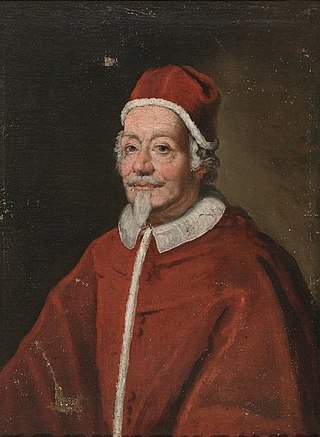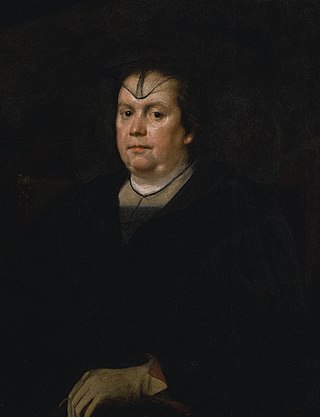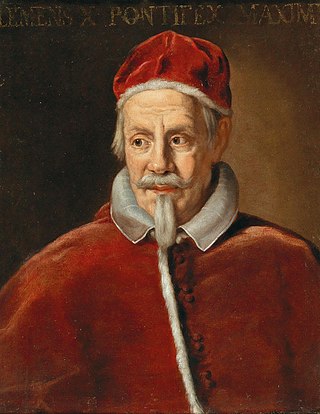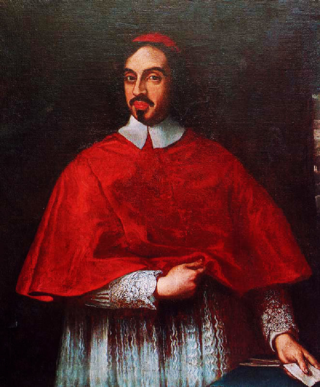Related Research Articles

Pope Alexander VII, born Fabio Chigi, was head of the Catholic Church and ruler of the Papal States from 7 April 1655 to his death in May 1667.

Pope Alexander VIII, born Pietro Vito Ottoboni, was head of the Catholic Church and ruler of the Papal States from 6 October 1689 to his death in February 1691. He is to date the last pope to take the pontifical name of "Alexander" upon his election to the papacy.

Pope Clement IX, born Giulio Rospigliosi, was head of the Catholic Church and ruler of the Papal States from 20 June 1667 to his death in December 1669.

Pope Innocent X, born Giovanni Battista Pamphilj, was head of the Catholic Church and ruler of the Papal States from 15 September 1644 to his death in January 1655.

Antonio Barberini was an Italian Catholic cardinal, Archbishop of Reims, military leader, patron of the arts and a prominent member of the House of Barberini. As one of the cardinal-nephews of Pope Urban VIII and a supporter of France, he played a significant role at a number of the papal conclaves of the 17th century. With his brothers Cardinal Francesco Barberini and Taddeo Barberini he helped to shape politics, religion, art and music of 17th century Italy. He is sometimes referred to as Antonio the Younger or Antonio Barberini iuniore to distinguish him from his uncle Antonio Marcello Barberini.

Decio Azzolino was an Italian Catholic Cardinal, code-breaker, investigator and leader of the Squadrone Volante.

Olimpia Maidalchini Pamphilj, , was the sister-in-law of Pope Innocent X (Pamphili). She was perceived by her contemporaries as having influence regarding papal appointments.

The 1667 papal conclave was convened on the death of Pope Alexander VII and ended with the election of Cardinal Giulio Rospigliosi as Pope Clement IX. The conclave was dominated by factions loyal to the cardinal nephews of Alexander VII and Urban VIII. It saw the continued existence of the Squadrone Volante, or Flying Squadron, that had emerged in the 1655 conclave. The conclave also saw Spain and France, the two largest Catholic powers at the time, both support Rospigliosi's election as pope. Ultimately, Rospigliosi's election was achieved when the French ambassador bribed Flavio Chigi, Alexander's nephew, to support Rospigliosi. Following the conclave all the parties believed they had elected the pope that they had wanted.

The 1669–70 papal conclave was convened on the death of Pope Clement IX and ended with the election of Cardinal Emilio Altieri as Pope Clement X. The election saw deference within the College of Cardinals to Louis XIV of France, and a freeing of the cardinals loyal to Spain to vote according to their conscience. Eventually the elderly Altieri was elected with support of the major factions within the College.

The 1676 papal conclave was convened after the death of Pope Clement X and lasted from 2 August until 21 September 1676. It led to the election of Cardinal Benedetto Odescalchi as Pope Innocent XI.

The 1644 papal conclave was called upon the death of Pope Urban VIII. It lasted from 9 August to 15 September 1644; the cardinal electors chose Cardinal Giovanni Battista Pamphili, who took office as Pope Innocent X.

Giulio Cesare Sacchetti was an Italian Catholic Cardinal and was twice included in the French Court's list of acceptable candidates for the Papacy, in 1644 and 1655.

Rinaldo d'Este was an Italian Catholic Cardinal.

The 1655 papal conclave was convened following the death of Pope Innocent X and ended with the election of Cardinal Fabio Chigi as Alexander VII. The conclave quickly reached a deadlock, with Giulio Cesare Sacchetti receiving 33 votes throughout the conclave, but never securing enough for his own election. After several months of deliberation and negotiation, Chigi was elected Pope when Cardinal Mazarin, the leader of the French government, consented to Chigi's election at the request of Sacchetti.

The 1689 papal conclave was convened after the death of Pope Innocent XI. It led to the election of Cardinal Pietro Vito Ottoboni as Pope Alexander VIII. The conclave saw previous factions join together because they lacked numerical strength, and saw the rise of the zelanti as a political force in the election of the next pope. Ottoboni was eventually unanimously elected with the consent of the secular monarchs, becoming the first Venetian in over 200 years to be elected pope.

Carlo Rossetti (Roscetti) (1614 – 23 November 1681) was an Italian Catholic Cardinal, born of the noble Rossetti family in Ferrara. Earlier in his career he went to London as a secret nuncio on behalf of Pope Urban VIII. While in London, he was addressed as Lord Charles Rossetti and was referred to as Prince Rossetti, using his title as Italian nobility for his cover, rather than as a representative of the Roman Catholic Church to avoid persecution.

Flavio Chigi was an Italian Catholic Cardinal and Duke of Ariccia. He was Cardinal-Nephew to Pope Alexander VII and became a powerful political force inside the Roman Catholic Church during the latter half of the 17th century.

The 1691 papal conclave was convened on the death of Pope Alexander VIII and ended with the election of Cardinal Antonio Pignatelli as Pope Innocent XII. It lasted for five months, from 12 February to 12 July 1691. The conclave became deadlocked after Catholic monarchs opposed the election of Gregorio Barbarigo, who some members of the College of Cardinals also viewed as too strict. The conclave only ended in the July when cardinals started to become ill from the heat, and after French cardinals agreed to vote for Pignatelli despite him coming from Spanish-controlled Naples.

Giovanni Stefano Donghi was an Italian Catholic cardinal.

Lorenzo Imperiali was an Italian Catholic cardinal.
References
- 1 2 3 History of the popes; their church and state (Volume III) by Leopold von Ranke (2009, Wellesley College Library)
- ↑ Church Politics in Seventeenth-Century Rome: Cardinal Decio Azzolino, Queen Christina of Sweden, and the Squadrone Volante - Acta Universitatis Stockholmiensis: Stockholm Studies in History by Marie-Louise Rodén, 2000, ISBN 91-22-01838-7
- ↑ Note: Though this also required Olimpia Maidalchini to be convinced – a group of older cardinals, perhaps including her long-time ally Azzolino, convinced her that Chigi presented a better option than a group of bored, younger cardinals looking to cause trouble (who might become bored enough to vote for anyone in protest).
- ↑ Pope Alexander the Seventh and the College of Cardinals by John Bargrave, edited by James Craigie Robertson (reprint; 2009)